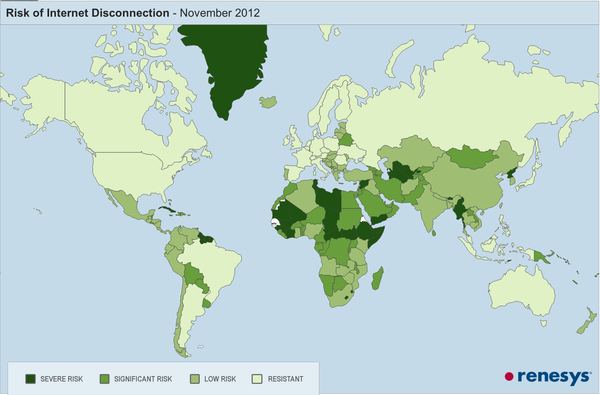How Hard Is It to Disconnect an Entire Country from the Internet?
It’s still not known who disconnected Syria’s Internet from the rest of the world last Thursday, but on Saturday someone turned it back on. The restoration, according to Renesys, a networking firm that tracks Internet connections, “was achieved just as quickly and neatly as the outage: like a switch being thrown.” The episode brought to mind a similar one in Egypt at the beginning of last year.
Shutting off an entire country’s connection to the rest of the world is obviously not as simple as throwing a switch. But imagine for a moment that such a metaphorical switch does exist. How hard is it to throw?
The answer depends on on how diverse a given country’s Internet infrastructure is. Generally, the greater the number of organizations within the country responsible for assigning IP addresses and routing traffic in from and out to the global network, the more complicated the task of completely disconnecting. In countries like Syria, Egypt, and Iran—where the Internet is highly regulated and control of traffic is confined to a few entities—the “switch” is much easier to throw.
Below is an up-to-date map in which countries are colored according to the Internet diversity at what the Renesys calls the “international frontier.” Citizens in countries colored dark green face “severe risk” of disconnection from the rest of the world. Countries colored the lightest green shade are the most “resistant,” according to Renesys.

Keep Reading
Most Popular
Large language models can do jaw-dropping things. But nobody knows exactly why.
And that's a problem. Figuring it out is one of the biggest scientific puzzles of our time and a crucial step towards controlling more powerful future models.
How scientists traced a mysterious covid case back to six toilets
When wastewater surveillance turns into a hunt for a single infected individual, the ethics get tricky.
The problem with plug-in hybrids? Their drivers.
Plug-in hybrids are often sold as a transition to EVs, but new data from Europe shows we’re still underestimating the emissions they produce.
Stay connected
Get the latest updates from
MIT Technology Review
Discover special offers, top stories, upcoming events, and more.